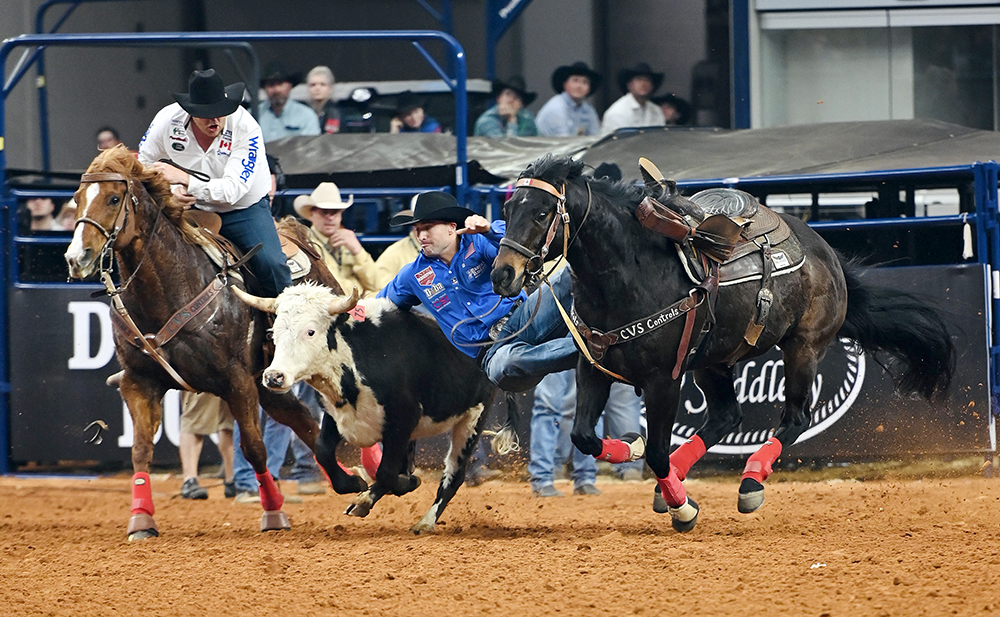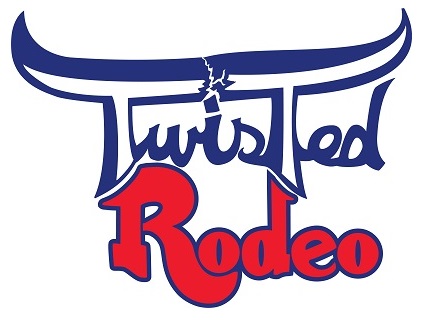
(RESISTOL PHOTOGRAPH BY MATTHEW RANGE)
Oregon bulldogger was a late bloomer, but the sport has changed his life
Most cowboys who make a living in rodeo have competed in the sport all their lives.
That’s not the case for Cinch endorsee Jesse Brown, a 29-year-old steer wrestler from Baker City, a community of 4,200 souls in northeastern Oregon. He was the typical boy, playing football, baseball and basketball in his youth. The only time he was horseback was when he was helping around the family’s place. The rest of his time was spent with a ball in hand.
He was an all-state football and basketball player, good enough to be a backup quarterback at Washington State University in the early 2010s.
“I loved football, and I loved basketball; those were my top two sports,” Brown said. “I’ll always love football and basketball.”
But there was something authentic about his calling to rodeo.
“My dad rode broncs professionally, and my mom ran some barrels, but I started pretty late … my senior year of college,” he said.
Even with a rodeo pedigree, Brown took his time in finding his own niche in the game. He focused on the sorts that carried his heart at the time they did. He tried his hand at college football for three years, then transferred to Montana State University to focus on his newly found rodeo career. He was even a qualifier to the College National Finals Rodeo.
“I’m glad I did it the way I did,” Brown said. “I love bulldogging, and I love being able to rodeo. I see a lot of kids that are homeschooled, and rodeo is all they do. I’m glad I got to do the other sports and enjoy that.
“My parents have always been super supportive and super positive about everything. They came to all my games, and they’re always wanting the best for me, promoting hard work. They didn’t necessarily know how to coach me in those sports, nor did they try. When it came to rodeo, my dad was out in the arena helping us every day.”
His all-around athleticism came into play fairly quickly. One doesn’t just start bulldogging and make the college finals in the same year. In 2015 and ’16, he won the PRCA’s Permit-Holder Challenge in Las Vegas, then followed that with the 2017 Resistol Rookie of the Year title.
He earned his first qualification to the National Finals Rodeo in 2020, one of 119 contestants to play the sport’s premier event in a baseball stadium, Globe Life Field in Arlington, Texas, home of the Texas Rangers. He returned to the NFR at its rightful home in Las Vegas this past December.
“I had a different experience, because my first one was in Texas,” he said. “That was great, and I got to win the round in my first round at the NFR. Then you go to Vegas, and it’s a completely different atmosphere. That’s what you always expected it to be.
“The NFR wasn’t my dream as kid, but as soon as I started this rodeo deal, it became my dream. It was what I could imagine. It’s worth it.”
He finished the 2020 campaign 13th in the world standings, then he earned nearly $73,000 in 10 December nights to finish sixth on the 2021 money list with $165,000 in annual earnings. That provided him an invitation to The American, which featured the top 10 contestants in each event from last year’s standings. Brown took advantage of everything provided him and walked away from AT&T Stadium as the event’s steer wrestling champion.
With that, he earned $100,000, which can be life-changing money. In a way, it just fortified with the Oregon cowboy has focused on the last several years.
“I don’t think anything’s really changed for me,” Brown said. “I finished off the winter rodeos, and I’ve been practicing and getting ready for the summer. I bought a horse and put some money in the stock market.
“Of course, then the stock market plummeted.”
He laughed, because the market can be much like the world of rodeo – it’s a roller coaster way of making a living. Momentum swings can hit from one week to another. The highs are great, and the lows can be a struggle, but consistency wins most of the time.
His only issue with his earnings at The American?
“The last few years, The American has counted for the world standings,” he said. “You win $100,000, and half of that counts. I’d say $50,000 going toward the standings would be sweet right now.”
As of June 6, Brown was 11th on the 2022 money list. He’s proven to be an elite steer wrestler, but he wants his level of consistency to be the standard by which he is judged. Sure, he’s nearly 30 years old, but he’s still a newcomer to rodeo compared to nearly every other bulldogger in the game.
“I’ve been very lucky to have very good coaching,” Brown said. “I got in with the right guys when I started out and with the right fundamentals from the beginning, and I practiced as hard as I could with what they gave me. Then I’ve been lucky enough to ride some very good horses.
“Horsepower is very important. The last three years, I’ve gotten to ride Tyson, and he’s won Horse of the Year the last two years. I’ve gone to the finals the last two years on him. I won The American on him. He’s helped my career a lot.”
Tyson is owned by Canadian Curtis Cassidy, one of Brown’s traveling partners. This year’s highway posse includes another Canadian, Tanner Milan, and a Minnesotan, J.D. Struxness. All four men in the rig have a combined 15 trips to the NFR.
“I think those guys are all positive, and it’s fun traveling with them,” Brown said. “When you’re having fun, it’s easier to win.
“My goal is to make the NFR every year until I retire and to win multiple gold buckles. To do that, I’m just going to do the same thing that got me here: Keep practicing hard, riding good horses and going with good guys.”
Rodeo may not have been Jesse Brown’s first love, but it’s found a special place in his heart. It’s why he’s had so much success in his first five years in the PRCA.
